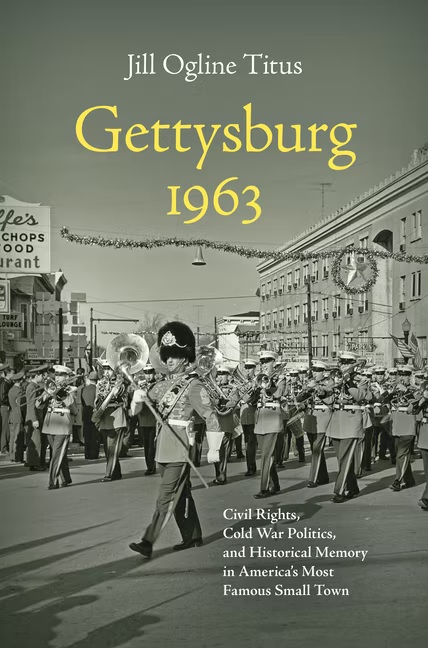Titus, Jill Ogline. Gettysburg 1963: Civil Rights, Cold War Politics, and Historical Memory in America’s Most Famous Small Town. Chapel Hill, NC: University of North Carolina Press, 2021.
Interfacing with the public on a given historical topic naturally lends you a unique perspective on historical memory; much the same effect can also occur from living in proximity to a significant historical shrine, and there are few more popular shrines in the United States than Gettysburg, where I (and the rest of the Concerning History staff) pursued my undergraduate degree for four years. Much of my views on modern education, politics, and of course historical memory stem from my experience there, and so picking up Gettysburg professor (and previous supervisor of mine) Jill Titus’s book on Gettysburg’s centennial commemorations in 1963 was a no brainer. I knew from my time at the Civil War Institute that Titus’s book would be at least solid, and I’m pleased to report that not only were my assumptions verified, but that she has delivered a near-perfect example of how a localized historical case study should be conducted.
While its titular focus is the occasion of commemorating the one hundredth anniversary of the Battle of Gettysburg in July 1963, Gettysburg 1963 uses those events as the climax of its narrative, treating readers to not only decades of previous historical context but other, even more crucial considerations unique to this small Pennsylvania town. As Titus so insightfully recognizes, Gettysburg is simultaneously an American symbol, a sacred landscape, and a living community, an interplay that drives tensions to this day. Where there is tension, however, there is rich opportunity for analysis, and Titus develops this framework into a fascinating, not to mention highly relevant, exploration of some of the foundations of modern America’s complicated relationship with its past. I had known bits and pieces of the story from my undergrad work, both in and out of the classroom, but it is truly astounding how potent the Civil War Centennial was with meaning for Americans of every creed. Civil Rights activists looked to the occasion as a solemn reminder that the cause of the Civil War was far from resolved; white supremacists seized the opportunity to resist civil rights and maintain the fiction that Confederates were proud Americans not fighting for slavery; Cold Warriors maintained nationalistic propaganda that emphasized reconciliation and the role of the Civil War in making America the super state of the later twentieth century. Watching all these themes play out in a small town landscape as residents dealt with concerns of racial justice, historical preservation, and commercial health in their own intimate ways results in a fascinating narrative that both explains so much about our modern discourse and brings a historical snapshot of a small town to life.
My only problems with Gettysburg 1963 come from my own familiarity with its subject matter, particularly my presence in Gettysburg during the commemoration of the war’s 150th anniversary in 2013. Titus admirably maintains her tight focus on the centennial until her epilogue, yet I couldn’t help but want to read the rest of the stories only hinted at in her work; the ultimate doom of the first park visitors’ center, the reversal of interpretive strategy, even the sesquicentennial itself. I cannot fault Titus for avoiding these tempting tangents, however, and indeed I believe it results in a much tighter, stronger history. For all its provincial focus, Gettysburg 1963 is in the final accounting a book with wide appeal and massive significance for modern America. Those interested in Civil Rights, the Cold War, the Civil War, historical memory, historical interpretation, or current political discourse can all find value within its pages.
